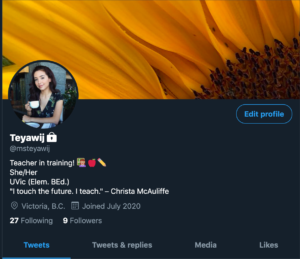
Building a PLN – Twitter Reflection
Like I said in my post about the Twitter chat, I took this course as an opportunity to build my PLN by using twitter. This meant finding, following, interacting, and sharing with peers, Dr. Roberts, and other educators that I admire and have something to learn from.

My first tweet
I first started by checking out people/resources that my pod peers were following, and following them myself. I’d have a scroll and click through their tweets, and find awesome conversations that I could potentially be a part of.
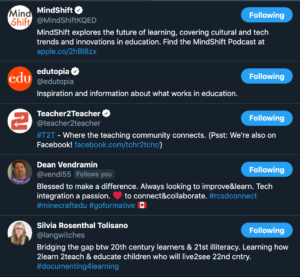
Some examples (not all) of people/resources I followed
I then took this opportunity to see what others were doing. I had no idea how to use Twitter, it’s features, etc. I was so grateful for my pod members who were also using Twitter, as I was able to check out their accounts and see their interactions which would inspire my own. Particularly Kayleigh Udy, who really inspired to me make a Twitter and showed me some great people to follow (eg. Dean Vendramin). I enjoyed checking out the great resources, podcasts, questions, and current events that my peers, Dr. Roberts, and others were sharing.
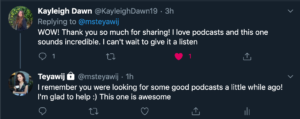
Kayleigh was looking for some podcasts and I was happy I was able to help out!

It was great to be able to interact with people from my cohort who are also members of EDCI339
When I felt confident, I started sharing resources that I resonated with and wanted other to see. My first retweet with a comment, I shared a MindShift podcast tweet that was talking about how teachers are adapting to the new environment of teaching online, and how they are adapting their practices to meet their students’ needs. This is something I find extremely interesting as not only am I an education student learning how I can effectively teach students online one day, but I am also a student who is navigating how to learn online myself! It’s a unique perspective, as I am simultaneously learning for myself as well as for my future students. It’s so important that everything we have learned so far about inclusive, culturally-responsive teaching practices is adapted to an online setting in a way that facilitates a “caring classroom” outside of the traditional “brick-and-mortar” setting. I’m currently watching my brother (grade 7) adapt to having his classes online, and I am both intrigued and nervous about what that means for his education. I also see my mother (high school teacher) doing her absolute best to keep and nurture her relationship with her students and their parents in the midst of online learning. I am no stranger to the scramble and chaos teachers felt in March when everything was made online, and I have been so lucky to have my mother to answer questions I have about how teachers are adapting in her district. It’s been so enriching, and my mother is such a strong, inspiring educator who isn’t letting her students’ education suffer because of this transition.
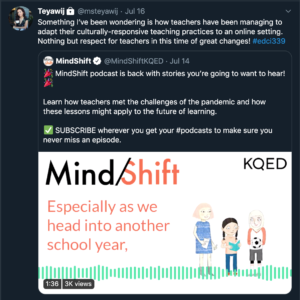
Asking questions & sharing curiosity
After sharing this, I was delighted to have Dr. Roberts respond to my tweet, building on my curiosity and allowing me to expand my thinking on the subject. My tweet was mainly focusing on teachers, and she reminded me about the importance of support for everyone involved in the ecosystem of learning. Teacher, students, parents, and guardians are all involved in a healthy learning process, and this pandemic has effected everyone’s interactions with one another. The support must include all members of the educational ecosystem, and I’m so glad that I was able to have someone support my question and build off of it to expand my thinking.
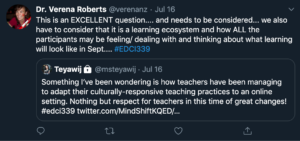
In addition to my EDCI339 interactions, I was also able to connect with valuable people from my past courses, including Dr. Valerie Irvine and Rich McCue, who were both amazing in our EdTech class last year. Dr. Irvine was a huge inspiration and supportive facilitator in opening my eyes to the world of educational technology and it’s place in supporting an inclusive learning environment for all. She helped us set up our blogs (that I’m obviously still using today), and it was great to be able to follow her and still maintain that connection. Her twitter offers me valuable insights and points-of-view that allow me to inquire further and think deep about the evolving education environment, and I am so happy for that!

Dr. V. Irvine

Rich McCue
I was also able to include on my Twitter important territorial acknowledgements that I feel are absolutely necessary in having the opportunity to learn at UVic. Though learning has shifted online currently and for the first upcoming Fall semester, we must acknowledge the First People whose land the University still stands. Online learning poses the opportunity for us, as future and current educators, to adapt our practices, and we must maintain respect for the historical, current, and future connections the Lekwungen, Songhees, Esquimalt, and W̱SÁNEĆ people have to the land.
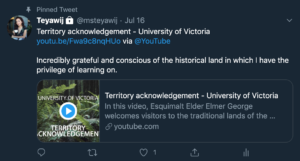
Connections to Course Topics:
Practice digital, networked, and open literacies in support of learning about distributed and open learning – By being able to connect with classmates, educators, and a plethora of resources, I was/am able to access, share, and find resources on up-to-date developments in open and distributed learning
Explore and engage with current literature on the distributed and open education movement – Much like above, Twitter offers a uniquely current and interactive approach to on only literature but many different kinds of resources! (Podcasts, videos, platforms, etc)